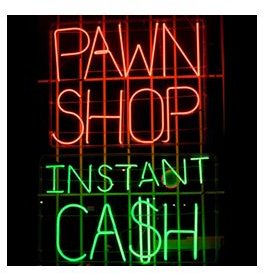Selling to and Buying From Pawn Shops: How Do Pawn Shops Determine Value?
Buying From a Pawn Shop: How Is Value Determined?
Often referred to as the Poor Man’s Bank, a pawn shop provides funds for those who are otherwise unable to secure a loan from a more traditional bank. A person can use automobile, jewelry, household goods, furniture, electric equipment, sports goods, musical instruments, cell phone, and anything of value as collateral. Thus lending as well as buying from pawn shops is easy and doesn’t require much effort.
How the Pawn Process Works
Pawning is the process of pledging personal property as collateral in exchange for quick loan for a definite period. A pawnbroker will determine the value of the pawned item on the basis of the percentage of its value and make an offer. The seller makes a decision whether to accept the terms of the loan or not. Usually customers get a definite period of time for paying off the loan amount, including transaction fees or interest before reclaiming their mortgaged items.
However, in case the customer opts not to redeem their collateral, they can intimate their desire to the pawnbroker to sell it, who will then put the item up for sale.
- Buying From Pawn Shops
Pawn shops can be a great place to buy rare items at a bargain price. However, buying any kind of item from pawn shops is easy and won’t cost much. Most of the pawn shops offer a return policy, which makes it easier to make the buying decision. You walk in the pawn shop, view and inspect the item, pay for it, and then leave for your destination.
- Selling to Pawn Shops
Once a pawnbroker is certain that the pawned item can be resold, they offer customers a price for their personal items. If the customer agrees to the deal, the pawnbroker will put the item on sale and even make a huge profit from it.
- Borrowing From Pawn Shops
Though borrowing from pawn shops is easy, it is difficult to get the desired price in exchange for the mortgaged item because pawnbrokers offer a small percentage of what the item is worth, usually about one-fourth of the resale value. Once the borrower agrees to the loan terms, he or she will be accepting to pay interest and storage for each month. In some cases, pawnbrokers let the interest build up for some months, which forces customers to pay a higher amount at the time of loan completion.
Borrowing from a pawnshop also involves other charges besides interest, such as storage, appraisal, handling, and insurance. If the customer fails to pay off the loan within the due period to reclaim the collateral, it becomes the property of the pawnshop.
Are Pawnshops Regulated?
It is a misconception that you endanger pawning an item to a pawn shop. Pawnbrokers are governed by some of the major federal laws that regulate other financial entities and institutions. Some of these federal laws are:
- USA Patriot Act
- Equal Credit Opportunity Act
- Bank Secrecy Act
- Data Privacy as part of the Federal Trade Commission (FTC) Rules
- Truth-in-Lending Act.
- Trading with the Enemy Act and related Executive Orders and Regulations
The pawn industry is regulated by states and federal agencies, and some of the pawn shops are regulated by local authorities as well. Pawn transactions must be reported to local law enforcement agencies. Most of the states require the pawn shops to report their transactions daily, including the customer’s personal information, which is to ensure protection from stolen items.

How Do Pawn Shops Determine Value of Pawned Goods?
To determine the value of pawned goods, pawn shops may consider several factors, including condition of the product, resale value of the product, and appraised market value. In this regard, they may also refer to search engines, product catalogs, or even consult experts. Taking all these factors into consideration, the pawn shop will offer a price for the item, which can be either sold by the customer or used as collateral. However, the appraisal process for every item varies. A jewelry set will certainly be evaluated differently than a cell phone.
Though there isn’t any minimum dollar amount set by state pawn laws for an item, the maximum amount is usually set. If you choose to pawn a personal item, check with more than one pawn shop to get the best bargain, as not all pawn stores offer the same price. It’s also a good idea to check online auction websites like eBay to help you determine a good price.
References
- Pawn Shops Today - https://www.pawnshopstoday.com/How_It_Works.html
- National Pawn Brokers - https://www.nationalpawnbrokers.org/files/Fed%20Regulations/Primary%20Federal%20Statutes%20and%20Regulations%20Applicable%20to%20the%20Pawn%20Industry%20January%202010%20BW.pdf
- National Pawn Brokers - https://www.nationalpawnbrokers.org/i4a/pages/index.cfm?pageid=1
Image Credits:
- Pawn Shop Sign - https://blogs.houstonpress.com/hairballs/pawn_shop_250x251.jpg
- Pawn Shop Owner - https://blog.cleveland.com/business/2008/03/pawnshop.jpg
